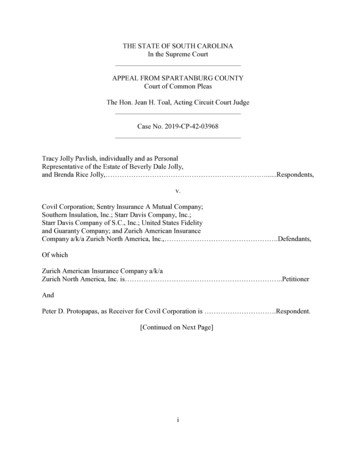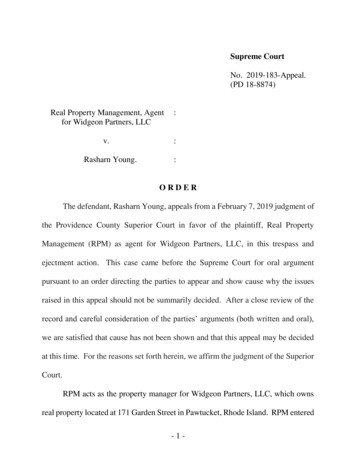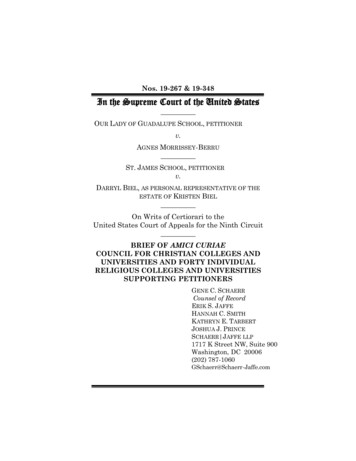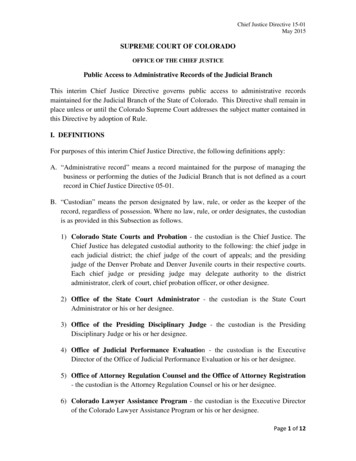
Transcription
Chief Justice Directive 15-01May 2015SUPREME COURT OF COLORADOOFFICE OF THE CHIEF JUSTICEPublic Access to Administrative Records of the Judicial BranchThis interim Chief Justice Directive governs public access to administrative recordsmaintained for the Judicial Branch of the State of Colorado. This Directive shall remain inplace unless or until the Colorado Supreme Court addresses the subject matter contained inthis Directive by adoption of Rule.I. DEFINITIONSFor purposes of this interim Chief Justice Directive, the following definitions apply:A. “Administrative record” means a record maintained for the purpose of managing thebusiness or performing the duties of the Judicial Branch that is not defined as a courtrecord in Chief Justice Directive 05-01.B. “Custodian” means the person designated by law, rule, or order as the keeper of therecord, regardless of possession. Where no law, rule, or order designates, the custodianis as provided in this Subsection as follows.1) Colorado State Courts and Probation - the custodian is the Chief Justice. TheChief Justice has delegated custodial authority to the following: the chief judge ineach judicial district; the chief judge of the court of appeals; and the presidingjudge of the Denver Probate and Denver Juvenile courts in their respective courts.Each chief judge or presiding judge may delegate authority to the districtadministrator, clerk of court, chief probation officer, or other designee.2) Office of the State Court Administrator - the custodian is the State CourtAdministrator or his or her designee.3) Office of the Presiding Disciplinary Judge - the custodian is the PresidingDisciplinary Judge or his or her designee.4) Office of Judicial Performance Evaluation - the custodian is the ExecutiveDirector of the Office of Judicial Performance Evaluation or his or her designee.5) Office of Attorney Regulation Counsel and the Office of Attorney Registration- the custodian is the Attorney Regulation Counsel or his or her designee.6) Colorado Lawyer Assistance Program - the custodian is the Executive Directorof the Colorado Lawyer Assistance Program or his or her designee.Page 1 of 12
Chief Justice Directive 15-01May 20157) Colorado Attorney Mentor Program - the custodian is the Executive Director ofthe Colorado Attorney Mentor Program or his or her designee.8) Office of Alternate Defense Counsel - the custodian is the Executive Director ofthe Office of Alternate Defense Counsel or his or her designee.9) Office of the Child’s Representative - the custodian is the Executive Director ofthe Office of the Child’s Representative or his or her designee.10) Office of the State Public Defender - the custodian is the State Public Defender orhis or her designee.C. “Financial record” means any documentation maintained to show the receipt,management or disbursement of funds by the Judicial Branch.D. The "Judicial Branch" includes Colorado State Courts and Probation, the Office of thePresiding Disciplinary Judge, the Office of Judicial Performance Evaluation, the Officeof Attorney Regulation Counsel, the Office of Attorney Registration, the ColoradoLawyer Assistance Program, the Colorado Attorney Mentor Program, the Office ofAlternate Defense Counsel, the Office of the Child’s Representative, and the Office ofthe State Public Defender. The Judicial Branch does not include the Judicial DisciplineCommission or the Independent Ethics Commission.E. “Person” means any natural person acting in an official or personal capacity, and anycorporation, limited liability company, partnership, firm or association.F. “Person in interest” means the person who is the subject of a record.G. “Personnel file” means any record maintained because of the employer-employeerelationship.II. ACCESS TO ADMINISTRATIVE RECORDSA. General Provision. All Judicial Branch administrative records shall be available forinspection by any person at reasonable times, except as provided in this interim ChiefJustice Directive or as otherwise provided by law, rule, or order. The custodian of anyadministrative records shall make policies governing the inspection of administrativerecords that are reasonably necessary to protect the records and prevent unnecessaryinterference with the regular discharge of the duties of the custodian or the custodian’soffice.B. Reasonable Actions Necessary to Locate Records. The custodian must takereasonable measures to locate any specific administrative record sought and to ensurePage 2 of 12
Chief Justice Directive 15-01May 2015public access to the administrative record without unreasonable delay or unreasonablecost.C. Trademark or Copyright Protection of Records. This Rule does not preclude theJudicial Branch from obtaining and enforcing trademark or copyright protection forany administrative record. The Judicial Branch is specifically authorized to obtain andenforce such protection in accordance with applicable federal law. This authorizationdoes not restrict public access to or fair use of copyrighted materials and does not applyto writings that are merely lists or other compilations.III. EXCEPTIONS AND LIMITATIONS ON ACCESS TO RECORDSA. Exceptions and Limitations on Access to Records. The custodian of anyadministrative record shall allow any person to inspect a record or any portion thereofexcept based on the following grounds or as provided in subsection B or C if suchinspection:1)Would be contrary to any state statute;2)Would be contrary to any federal statute or regulation;3)Is prohibited by court order or rule; or4)Could compromise the safety or security of a Judicial Branch employee.B. Grounds for Denial of Inspection.1) Unless otherwise provided by law, rule, or order, the custodian may denyinspection of the following records on the ground that disclosure would be contraryto the public interest:a. Applications, screening grids, results of employment examinations, andinterview notes pertaining to the recruitment and selection of personnel.b. Information related to research projects conducted by or in affiliation withthe Judicial Branch.c. E-mail addresses provided by a person to the Judicial Branch for thepurpose of future electronic communications to the person from the JudicialBranch.d. E-mail addresses of any person currently or formerly associated with theJudicial Branch by virtue of employment, internship, volunteer position,contracting, or appointment to a board, commission, or committee.Page 3 of 12
Chief Justice Directive 15-01May 2015e. Individual signatures that may constitute confidential personal information.f. Contracts and assignment letters related to the Senior Judge Program unlessfinancial and personal contact information has been redacted.g. Financial records of judges and justices unless personal contact informationhas been redacted.h. Training, professional development, and professional education materialscreated by Judicial Branch employees, contractors, interns, or volunteers.i. Written communication from the public implying that the author intendedthe communication to be confidential and written communication from thepublic for the purpose of requesting assistance with personal mattersaffecting the author that are not publicly known, as well as anycommunication from the Judicial Branch in response.j. Records related to legislation, including documents related to fiscal notes,proposed or introduced legislation, and the drafting of bills or amendments.k. Overly broad or ambiguous requests that encompass all or substantially allof a large category of records and that are without sufficient specificity toreasonably allow the custodian to prepare or gather the records as set forthin Section 4.2) Notwithstanding any provision to the contrary in this Subsection, the custodianshall deny inspection of any record that is confidential by law, rule, or order.C. Mandatory Denial of Inspection. Unless otherwise provided by law, rule, or order,the custodian must deny inspection of the following records:1) Medical, mental health, sociological, and scholastic achievement data on individualpersons and groups from which individuals can be identified.2) Personnel files, with the following exceptions:a. Dates of employment;b. Classification, job title, job description including duties, and salary range;c. Salary;d. The cover sheet of an evaluation; andPage 4 of 12
Chief Justice Directive 15-01May 2015e. The fact of discipline.This paragraph 2) does not prevent the person in interest from requesting information fromhis or her own personnel file or from granting written, signed permission for a third partyto access specific components of his or her personnel file that are subject to inspection bythe employee.3) Trade secrets and proprietary information including copyright and trademarkmaterials; software programs; network and systems architectural designs; sourcecode; source documentation; project management materials developed ormaintained by the Judicial Branch; information in tangible or intangible formrelating to released and unreleased Judicial Branch software or hardware, userinterface specifications, use case documents, images and design screens, databasedesign structures and architecture, security structures and architecture; the JudicialBranch’s original design ideas; the Judicial Branch’s non-public business policiesand practices relating to software development and use; and the terms andconditions of any actual or proposed license agreement or other agreementconcerning the Judicial Branch’s products and licensing negotiations.4) Library and museum records contributed by private persons, to the extent of anylimitations placed thereon as conditions of such contributions.5) Privileged information; confidential legal, commercial, financial, geological, orgeophysical data; and confidential personal information, including home addresses,telephone numbers, social security numbers, birth dates, and other uniqueidentifying information.6) All data pertaining to administration of a licensing or certification examination,including test questions, applicant answers, scoring keys, all grading informationand materials, and graded answers.7) Names, addresses, e-mail addresses, telephone numbers, and personal financialinformation of users of public facilities or cultural services that are owned andoperated by the Judicial Branch. This Subsection does not prohibit the publicationof such information in an aggregate or statistical form if the identity, location, orhabits of individuals are not revealed. This Subsection does not prohibit thecustodian from transmitting data to any agent of an investigative branch of a federalagency or any criminal justice agency as defined in section 24-72-302(3), C.R.S.,who makes a request to the custodian to inspect such records and who asserts thatthe request for information is reasonably related to an investigation within thescope of the agency’s authority and duties.Page 5 of 12
Chief Justice Directive 15-01May 20158) Security records, including records regarding security plans developed ormaintained by the Judicial Branch, such as:a. Details of security plans and arrangements, investigation reports, auditreports, assessments reports, specific incident reports, warnings,investigations, emergency plans, building floor plans and blueprints,building access details, equipment, visitor and vendor logs, surveillance,network and systems topology, and network and systems security design;b. Reports of loss that relate to security measures;c. Any records of the intelligence information or security procedures of anysheriff, prosecuting attorney, or other law enforcement agency, orinvestigatory files compiled for any law enforcement purpose related tosecurity measures;d. Portions of records of the expenditure of public moneys containing detailsof security plans and arrangements or investigations. Records of theexpenditure of public moneys on security arrangements or investigations,including contracts for security plans and arrangements and records relatedto the procurement of, budgeting for, or expenditures on security systems,are otherwise available for inspection; ande. Any record provided by another public entity that contains specializeddetails of security arrangements or investigations. The Judicial Branchcustodian must refer a request to inspect the record to the public entity thatprovided the record and shall disclose to the requestor the name of thepublic entity.Paragraph 8) does not prohibit the custodian from transferring records containingspecialized details of security arrangements or investigations to the Division of HomelandSecurity and Emergency Management in the Department of Public Safety, the governingbody of any city, county, or other political subdivision of the state, or any federal, state, orlocal law enforcement agency. The custodian shall not transfer any record received from anongovernmental entity without the prior written consent of the entity unless suchinformation is already publicly available.9)Any probation supervision files not included in Chief Justice Directive 05-01.10) Useful Public Service supervision files. This Subsection does not prevent thedisclosure of records related to nonprofit agencies partnering with the JudicialPage 6 of 12
Chief Justice Directive 15-01May 2015Branch in the Useful Public Service program once signature verification pageshave been redacted.11) Portions of records that reveal a crime victim’s personal identifying information.12) Juror records, except as provided by law, rule, or order.13) Collection files pertaining to a person, including collections investigator files.Such files shall be available to the person in interest to the extent permitted bylaw, rule, or order. Aggregate or statistical information related to collection filesis available for inspection.14) Search warrants that do not have a return of service, except when requested bythe law enforcement agency that sought the warrant.15) Individual-level responses to surveys conducted by or for the Judicial Branch tocollect Judicial Branch performance evaluation information. The aggregateresults of such surveys are available for inspection.16) Reports and related documents, which are prepared by or for the Judicial Branchfor internal use in evaluating the performance of the Judicial Branch if material isso candid or personal that public disclosure is likely to stifle the frank exchangeof ideas and opinions critical to decision-making processes.17) Reports and related documents prepared by the Judicial Branch to monitorprotected party proceedings unless ordered by a judge in a specific court action.Aggregate or statistical information related to protect party proceedings isavailable for inspection.18) Purchasing records related to a service or product purchased from a vendor thatreveals information related to a particular court case or trade secrets or that aremarked confidential by the vendor. Records related to the purchasing process,including the criteria and scoring, are not available for inspection until thepurchasing process is finalized and any information identifying the scorekeeperon the scoring sheets has been redacted.19) The following financial records:a. Financial records that involve or implicate confidential information orprivileged attorney-client communication, work product, or advice given inthe course of professional employment;b. Financial records that involve or implicate security measures;Page 7 of 12
Chief Justice Directive 15-01May 2015c. Identifying bank account information such as bank account number, PublicDeposit Protection Act account number, and account owner signature card;d. Federal Tax Identification information including Employer IdentificationNumber;e. Financial records that reveal a crime victim’s or a witness’s personalidentifying information; andf. Portions of financial records that contain personal identifying informationof Judicial Branch employees or payees.20) Records regarding an independent contractor’s personal financial information andrecords maintained for the purpose of evaluating an independent contractor’scontract with respect to qualifications and performance under the contract.21) Case-related communication between independent contractors, or their agents,and the contracting Judicial Branch agency. This communication may includebilling records; requests for fees in excess of presumptive maximums; requestsfor experts, investigators, paralegals, social workers, and interpreters; requests forlitigation support including motions, legal research, exhibits, and travel;complaint investigations; and communication related to case strategy.22) Investigation records, such as:a. Any record of civil or administrative investigations authorized by law, rule,or order conducted by the Judicial Branch unless the record is available forinspection pursuant to law, rule or order; andb. Any record of an internal personnel investigation. If the person in interestappeals a final personnel action taken, disclosure may only be madepursuant to applicable law, rule, or order.23) Judicial application records submitted by or on behalf of an applicant for anyjudicial office, in any court of record who is not listed on the nominee list certifiedto the governor as described in the Colorado Constitution, article VI, section 20.Portions of the Judicial Nominating Commission Application for Colorado StateCourt Judgeship designated as confidential, including letters of reference, are notavailable for inspection. Any record submitted by or on behalf of a nomineecertified to the governor is available for inspection until a judicial appointment ismade. After a judicial appointment is made, the public portions of the applicationonly of the person appointed are available for inspection.Page 8 of 12
Chief Justice Directive 15-01May 201524) Work product, including all advisory or deliberative materials assembled for thebenefit of the Judicial Branch that express an opinion or are deliberative in natureand are communicated for the purpose of assisting the Judicial Branch inperforming its duties, such as:a. Communication, notes, and memoranda that relate to or serve asbackground information for such duties; andb. Preliminary drafts and discussion copies of documents that express adecision, determination, or conclusion by the Judicial Branch.25) Records protected under the common law governmental or deliberative processprivilege, if the material is so candid or personal that public disclosure is likely tostifle honest and frank discussion within the Judicial Branch. The Judicial Branchadopts the position that public disclosure of such records impairs the decisionmaking process, causing substantial injury to the public interest. If anyadministrative record is withheld pursuant to this Subsection, the custodian mustprovide a statement describing the record withheld.D. Petition for Order Permitting Restriction.1) In addition to any of the foregoing, if in the opinion of the custodian access to thecontents of a record would do substantial injury to the public interest,notwithstanding the fact that the record might otherwise be available for inspection,or if the custodian is unable, in good faith, after exercising reasonable diligence,and after reasonable inquiry, to determine if this interim Chief Justice Directiverestricts access to the record, the custodian may petition the district court of thedistrict in which the record or the custodian is located for an order permittingrestriction of access to the record or for the court to determine if access to therecord is restricted. Hearing on the petition shall be held at the earliest practicaltime. The person seeking access to the record must be served with notice of thehearing pursuant to the Colorado Rules of Civil Procedure and has the right toappear and be heard.2) In the case of a record otherwise available for inspection pursuant to this interimChief Justice Directiv
Office of Alternate Defense Counsel - the custodian is the Executive Director of the Office of Alternate Defense Counsel or his or her designee. 9) Office of the Child’s Representative- the custodian is . the Executive Director of the Office of the Child’s Representative or his or her
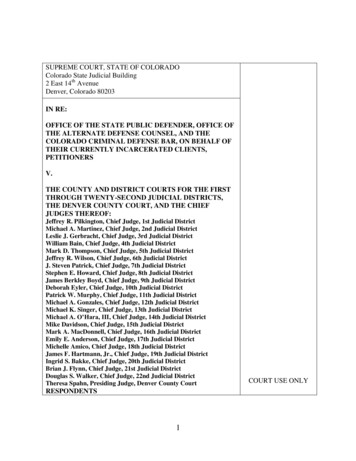
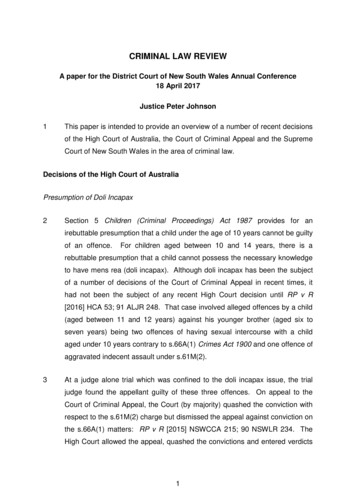
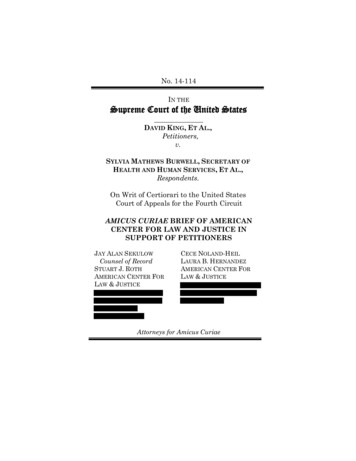
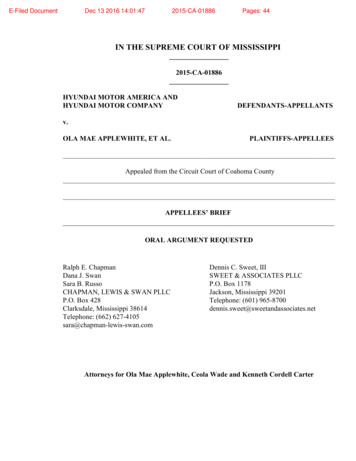
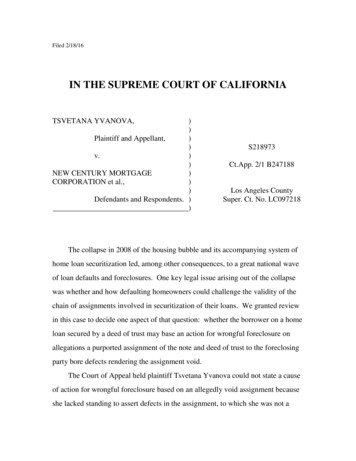
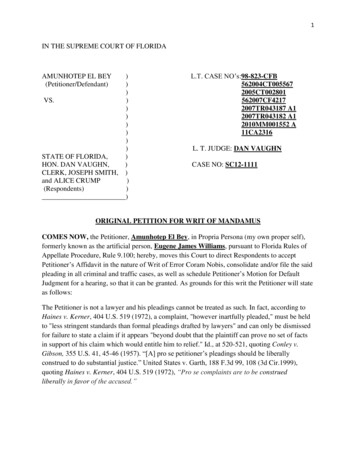
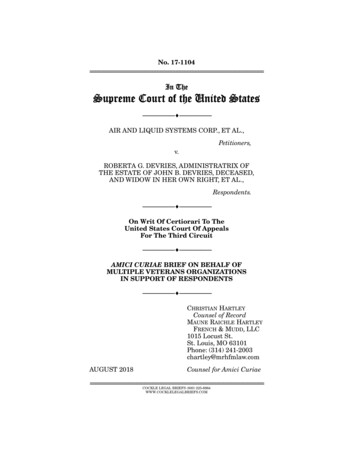
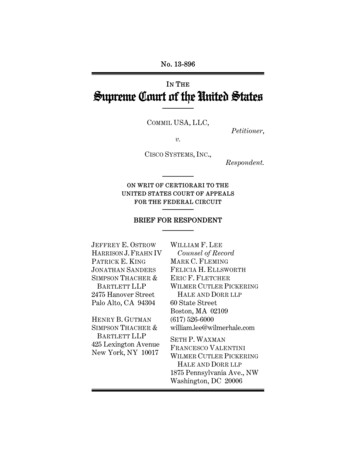
![IN THE SUPREME COURT OF T]-lE STATE OF MONTANA](/img/7/526b198c923f8.jpg)
